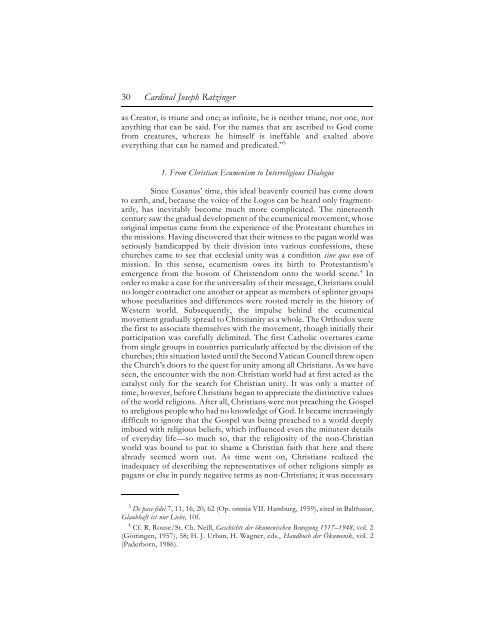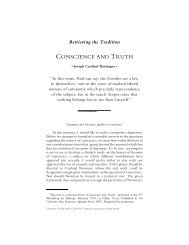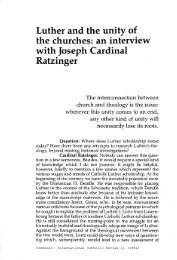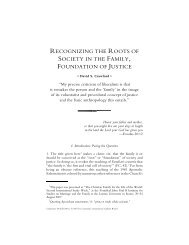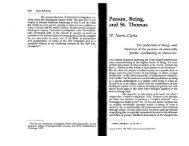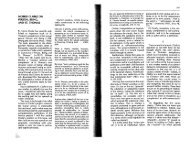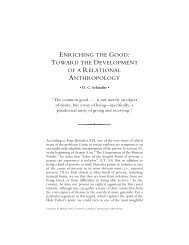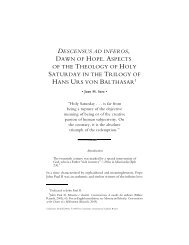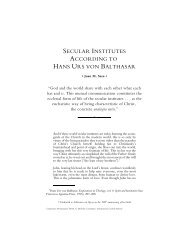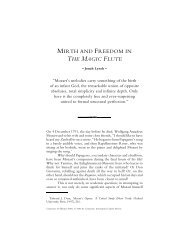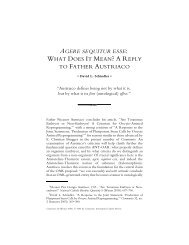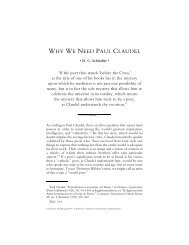Interreligious Dialogue and Jewish-Christian Relations - Communio
Interreligious Dialogue and Jewish-Christian Relations - Communio
Interreligious Dialogue and Jewish-Christian Relations - Communio
You also want an ePaper? Increase the reach of your titles
YUMPU automatically turns print PDFs into web optimized ePapers that Google loves.
30 Cardinal Joseph Ratzinger<br />
as Creator, is triune <strong>and</strong> one; as infinite, he is neither triune, nor one, nor<br />
anything that can be said. For the names that are ascribed to God come<br />
from creatures, whereas he himself is ineffable <strong>and</strong> exalted above<br />
everything that can be named <strong>and</strong> predicated.” 3<br />
1. From <strong>Christian</strong> Ecumenism to <strong>Interreligious</strong> <strong>Dialogue</strong><br />
Since Cusanus’ time, this ideal heavenly council has come down<br />
to earth, <strong>and</strong>, because the voice of the Logos can be heard only fragmentarily,<br />
has inevitably become much more complicated. The nineteenth<br />
century saw the gradual development of the ecumenical movement, whose<br />
original impetus came from the experience of the Protestant churches in<br />
the missions. Having discovered that their witness to the pagan world was<br />
seriously h<strong>and</strong>icapped by their division into various confessions, these<br />
churches came to see that ecclesial unity was a condition sine qua non of<br />
mission. In this sense, ecumenism owes its birth to Protestantism’s<br />
emergence from the bosom of Christendom onto the world scene. 4 In<br />
order to make a case for the universality of their message, <strong>Christian</strong>s could<br />
no longer contradict one another or appear as members of splinter groups<br />
whose peculiarities <strong>and</strong> differences were rooted merely in the history of<br />
Western world. Subsequently, the impulse behind the ecumenical<br />
movement gradually spread to <strong>Christian</strong>ity as a whole. The Orthodox were<br />
the first to associate themselves with the movement, though initially their<br />
participation was carefully delimited. The first Catholic overtures came<br />
from single groups in countries particularly affected by the division of the<br />
churches; this situation lasted until the Second Vatican Council threw open<br />
the Church’s doors to the quest for unity among all <strong>Christian</strong>s. As we have<br />
seen, the encounter with the non-<strong>Christian</strong> world had at first acted as the<br />
catalyst only for the search for <strong>Christian</strong> unity. It was only a matter of<br />
time, however, before <strong>Christian</strong>s began to appreciate the distinctive values<br />
of the world religions. After all, <strong>Christian</strong>s were not preaching the Gospel<br />
to areligious people who had no knowledge of God. It became increasingly<br />
difficult to ignore that the Gospel was being preached to a world deeply<br />
imbued with religious beliefs, which influenced even the minutest details<br />
of everyday life—so much so, that the religiosity of the non-<strong>Christian</strong><br />
world was bound to put to shame a <strong>Christian</strong> faith that here <strong>and</strong> there<br />
already seemed worn out. As time went on, <strong>Christian</strong>s realized the<br />
inadequacy of describing the representatives of other religions simply as<br />
pagans or else in purely negative terms as non-<strong>Christian</strong>s; it was necessary<br />
3 De pace fidei 7, 11, 16, 20, 62 (Op. omnia VII. Hamburg, 1959), cited in Balthasar,<br />
Glaubhaft ist nur Liebe, 10f.<br />
4 Cf. R. Rouse/St. Ch. Neill, Geschichte der ökumenischen Bewegung 1517–1948, vol. 2<br />
(Göttingen, 1957), 58; H. J. Urban, H. Wagner, eds., H<strong>and</strong>buch der Ökumenik, vol. 2<br />
(Paderborn, 1986).


